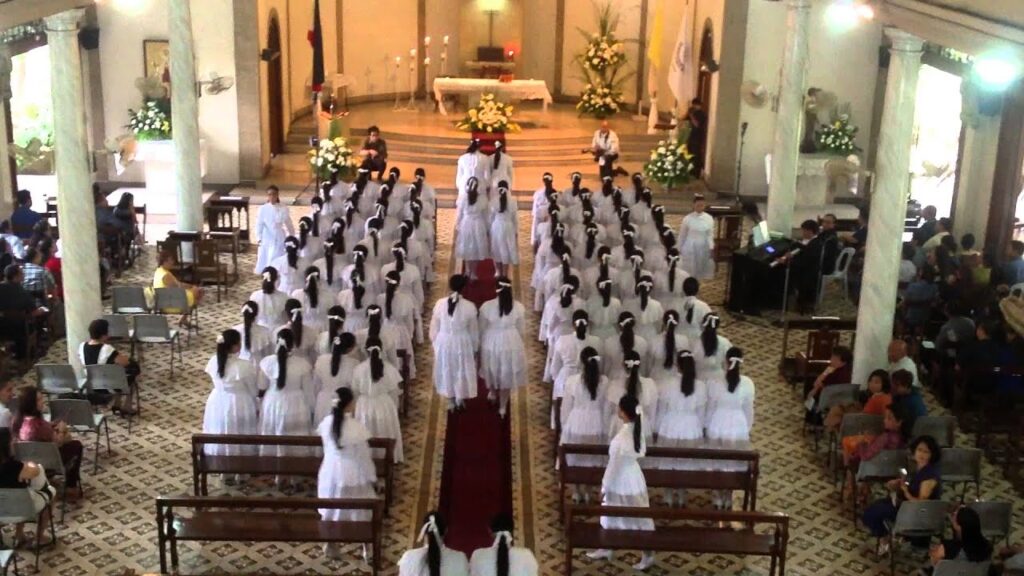Saturday, April 4th, 2020...7:33 pm
“one peso for every Ilonggo word you say”: The Prestige of English in the Philippines
Gabrielle Torres
The nuns would say to us neat little school girls in our neat little school uniforms that only English and Tagalog should be spoken within school property. I was born in Iloilo City, Philippines, where people speak Ilonggo, a language spoken by approximately 9 million people. You’re probably wondering, ‘Why not speak Ilonggo in your school, then? It’s not a dying language and it’s spoken by millions of people, anyway.’ Well, Ilonggo is not a standardized language and most definitely not as prestigious as English. Ilonggo is a funny-sounding language with too many vowels in one word, and if you are unfamiliar with the language, all you can hear are the glottal and velar stops. Still, why do Filipinos perceive English as prestigious? Within the privileged Filipino community, the English language is utilized to create a cultural divide between the highly educated English-speaking Filipinos and the less-privileged non-English-speaking Filipinos. Since English is the language of the elite and the educated in the Philippines, it is also the language of the privileged.

Fig 2. Still from Alpos, The Graduates of Assumption Iloilo High School 2013-2014 (4:13)
I spent ten years in a private Catholic school in Iloilo, founded by the Sisters of the Religious of the Assumption of Spain. The languages used by my teachers when teaching were English and Tagalog. My only textbook written in Tagalog was the textbook needed for Filipino class. We prayed, greeted our teachers, sang mass songs, took notes, wrote our reflections, sang the school anthem, recited, and answered our teacher’s questions in English. Whenever my friends and I would see a nun or a teacher walking towards us from ten meters away, we immediately switched from Ilonggo to Tagalog or English. If my friends and I were feeling sassy, we would talk in Taglish, a language that code-switches between Tagalog and English. In her article “The English Language Plays A Role in Dividing Cultures,” Medina shares that her mother “was chastised when she would speak in her native dialect” (par. 3). I feel for Medina’s mother. My grade school teacher would threaten us to pay “one peso for every Ilonggo word you say.” I did not realize how much the English language was being ingrained in my life, in the lives of my fellow Filipinos who had to go through what I did. English became a part of my identity so much that I became deprived of my own culture, of my own country’s national language, Tagalog.
In the Philippines, when Filipinos start to speak or ask a question in English in public, the people around them immediately identify them as either middle/high-class, educated, elite, rich, Filipino-American, or all of the above! There is not a single highly educated and privileged Filipino who cannot speak English. As long as they can speak English fluently, it does not matter whether or not they have an accent. Hau and Tinio’s chapter “Language Policy and Ethnic Relations in the Philippines” claims that “the continued use of English has preserved the gap between the urbanized, educated elite and the majority of people who are not functionally literate in English” (344). Unfortunately, social class divide starts young. As a kid, I was told that children who attended public schools are illiterate in English compared to children who attended private schools. I left Iloilo eight years ago. Back then, public schools used Tagalog as the medium for teaching while private schools used English. Sometimes, Taglish was used when necessary. Hau and Tinio demonstrated exactly what the English language stands for in the Philippines:
English is the most prestigious language in the Philippines, and proficiency in English is associated with the Filipino elite . . . English is seen as the language of the rich. Fluency in English is also considered an index of educational attainment and is acknowledged to be the key to power and social mobility. The motivations for learning English, therefore, are both instrumental and integrative: to be able to afford better economic opportunities on the one hand, and to identify with the educated Filipino elite on the other. (344-345)
Growing up in a household of engineers, professors, and teachers, it was essential for children who grew up in a middle/upper-class household to be literate and competent in the English language.
For Filipinos, English is, indeed, the language of the privileged and an important tool for travelling, working, and/or studying abroad. After living in Canada for five years, I decided to go back to Iloilo City. My aunt—Psychology Professor at the University of the Philippines and a competent, fluent speaker of English—would let me tag along with her and sit in her classes (and there I would be, sitting on a rickety wooden chair-desk furniture thing in the corner, judging the English of her students and cringing at the sound of their Ilonggo-accented English. What a privileged Filipino thing to do). Medina states that English “is the primary language of academia, as well as a requirement for many universities and businesses” (par. 5). Indeed, my aunt taught and spoke in English to her students inside and outside of the classroom. Even when she argued with me or tried to make a point, she did it in English. I was told by my grandmother, teacher in English at the Aklan College, that if I became fluent in the English language, I would become successful in whatever career I chose and in travelling. In fact, my grandmother was right. Having acquired and learned English since kindergarten, I arrived on Canadian territory confident that I could fluently speak the language of English-speaking Canadians. Since most members of my family are associated with academia, it is predisposed that I would have grown up being taught English at home and at my private school.
Darvin created a study between two English-speaking Filipinos, Ayrton and John. Ayrton being the high-class privileged Filipino and John the opposite. What struck me the most was how similar I was (unfortunately) to Ayrton:
Ayrton on the other hand slips into his Canadian identity quite easily. Referring to his classmates in the private school he goes to, most of whom come from wealthy families, he shares, “The moment I tell them I’m Filipino they wouldn’t believe me mainly because I don’t look like someone who’s from the Philippines” . . . Ayrton seems to take pride in not being recognized as Filipino, and it is interesting to note here how ethnicity intersects with class, the subtext being that in this private high school that caters to an elite class, he is not positioned as someone from a developing country like the Philippines. (Darvin 303)
Like Ayrton, I felt like I was not Filipino because of the colour of my skin. It also reached to a point that I did not want to join Filipino clubs or gatherings because I accepted the fact that I was proficient in English and not Tagalog. I would surround myself with only Filipinos who were proficient in English. What I experienced, which was disengaging and disassociating myself from Filipinos, “is exactly what expecting everyone to speak English does. It enforces barriers to three quarters of the world” (Nielsen par. 7). In other words, I was creating a barrier towards the working-class Filipinos who were not proficient in English. I put myself on a pedestal and internalized my racism because of my upper-class identity that corresponded to my proficiency in the English language.
Ultimately, Filipinos perceive English as prestigious because of the language’s reputation in the academia, business, elite, and government of the Philippines. English-speaking Filipinos are associated with the upper class and with those privileged enough to learn English. The teaching and the imposing of the English language is targeted at a young age, mostly in Catholic private schools in the Philippines. Learning in English at a young age put me in an advantage where I am able to speak confidently in English-speaking countries and study in a Canadian university. However, my identity as a privileged Filipino put me in a situation in my life where I began to realize that I have internalized my race and created a barrier towards own culture.
Works Cited
Alpos, Moses. The Graduates of Assumption Iloilo High School 2013-2014. YouTube, uploaded by Moses Alpos, 27 March 2014. https://www.youtube.com/watch?v=UWoYN 5tWNqw&list=PLT4Twi4ystgc-l_eaf1MPmx1ofe5vuymw&index=32.
Darvin, Ron. “Social Class and the Inequality of English Speakers in a Globalized World.” Journal of English as a Lingua Franca, vol. 6, no. 2, 2017, pp. 287–311.
Hau, Caroline S. & Victoria L. Tinio. “Language Policy and Ethnic Relations in the Philippines.” Fighting Words: Language Policy and Ethnic Relations in Asia, edited by Michael E. Brown and Sumit Ganguly, MIT Press, 2003, pp. 319-349.
Medina, Maris. “The English Language Plays A Role in Dividing Cultures.” The Diamondback, 16 March 2017, https://www.dbknews.com/2017/03/16/english-divide-culture-primary-language/. Accessed 7 March 2020.
Nielsen, Robert. “Why English Should Not Be the International Language of The World.” Whistling in The Wind, 11 Feb 2015, https://whistlinginthewind.org/2015/02/11/why-english-should-not-be-the-international-language-of-the-world/. Accessed 11 March 2020.
Villarete, Nico. “Inglesero, Hispanggol, and the Myth of the Great Cultural Divide.” Rappler.com. Graphic. Accessed 11 March 2020.

Comments are closed.